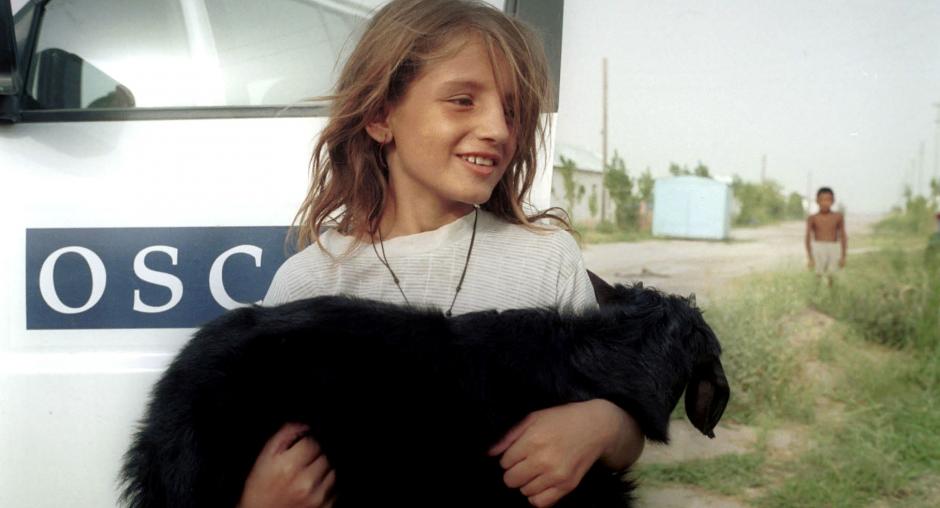Newsroom
OSCE Centre in Dushanbe marks 10th anniversary
DUSHANBE 27 February 2004

(OSCE/Lubomir Kotek)A girl meets OSCE staff in the village of Navruz, in southern Tajikistan's Kabodian district. (OSCE/Lubomir Kotek) Photo details
DUSHANBE, 27 February 2004 - The OSCE Centre in Dushanbe today celebrated its 10th anniversary, having begun its work in February 1994. The event was attended by Tajik government and parliament officials, political leaders, members of the media and non-governmental organizations, representatives of foreign embassies and international organizations.
Tajik First Deputy Minister of Foreign Affairs, Sirodjiddin Aslov, praised the positive role the OSCE has played in the field of political reform, as well as thanking it for its help in adapting Tajik legislation to international standards. He also highlighted the importance of the mine-clearing programme that the OSCE Centre began in Tajikistan in 2003.
"As a participating State since 1992, Tajikistan adopts OSCE principles and commits itself to democratization, respect for human rights, market reforms and regional co-operation" said Ambassador Yves Bargain, Head of the OSCE Centre.
The mission to Tajikistan was the first OSCE Mission in Central Asia.
Together with the United Nations Mission of Observers in Tajikistan (UNMOT), the Centre has assisted in the implementation of the peace progress and acted as a guarantor of the Tajik Peace Agreement reached in June 1997. In this capacity, it has worked to facilitate the implementation of the Agreement, and particularly protocols dealing with political issues, return of refugees, and military issues. The implementation of the peace agreement was successfully completed with the holding of multi-party parliamentary elections in February 2000.
Given the progress made by the country since the end of the civil war, the OSCE Permanent Council designed a new mandate in October 2002, and the mission was re-named: OSCE Centre in Dushanbe.
The Centre has been promoting equal rights for all citizens and improving living conditions for jailed persons. Field offices tackle a number of issues such as ownership and occupation of homes and land, fair treatment of prisoners and army draftees (including the release of illegally detained persons), locating missing persons, assisting with the development of the local media, gender issues, human rights education, and equal distribution of humanitarian aid by local authorities
After the establishment of Field offices in Kurgan-Tiube, Shaartuz, Garm, Khudjand and Kuliab over the past decade, the OSCE Centre is now present in most of the regions of Tajikistan.
Tajik First Deputy Minister of Foreign Affairs, Sirodjiddin Aslov, praised the positive role the OSCE has played in the field of political reform, as well as thanking it for its help in adapting Tajik legislation to international standards. He also highlighted the importance of the mine-clearing programme that the OSCE Centre began in Tajikistan in 2003.
"As a participating State since 1992, Tajikistan adopts OSCE principles and commits itself to democratization, respect for human rights, market reforms and regional co-operation" said Ambassador Yves Bargain, Head of the OSCE Centre.
The mission to Tajikistan was the first OSCE Mission in Central Asia.
Together with the United Nations Mission of Observers in Tajikistan (UNMOT), the Centre has assisted in the implementation of the peace progress and acted as a guarantor of the Tajik Peace Agreement reached in June 1997. In this capacity, it has worked to facilitate the implementation of the Agreement, and particularly protocols dealing with political issues, return of refugees, and military issues. The implementation of the peace agreement was successfully completed with the holding of multi-party parliamentary elections in February 2000.
Given the progress made by the country since the end of the civil war, the OSCE Permanent Council designed a new mandate in October 2002, and the mission was re-named: OSCE Centre in Dushanbe.
The Centre has been promoting equal rights for all citizens and improving living conditions for jailed persons. Field offices tackle a number of issues such as ownership and occupation of homes and land, fair treatment of prisoners and army draftees (including the release of illegally detained persons), locating missing persons, assisting with the development of the local media, gender issues, human rights education, and equal distribution of humanitarian aid by local authorities
After the establishment of Field offices in Kurgan-Tiube, Shaartuz, Garm, Khudjand and Kuliab over the past decade, the OSCE Centre is now present in most of the regions of Tajikistan.
